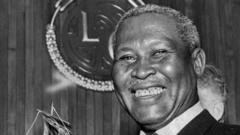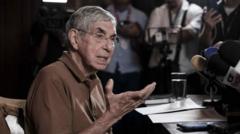Jimmy Carter, who became an emblematic figure in American politics and international diplomacy, passed away at the age of 100, leaving behind a profound legacy marked by perseverance and humanitarian efforts.
Jimmy Carter: The Legacy of a Peacemaking President who Defied the Odds

Jimmy Carter: The Legacy of a Peacemaking President who Defied the Odds
Exploring the extraordinary life of the 39th president who rose from humble beginnings to champion human rights and global peace.
Jimmy Carter, the 39th president of the United States, has passed away at the age of 100 at his home in Plains, Georgia. Known for his commitment to social justice and global peace, Carter's life journey from a peanut farmer to president encapsulated a dedication to service that extended far beyond his time in office.
Carter assumed the presidency during a tumultuous period marked by the fallout from Watergate and Vietnam. He aspired to heal the nation and pursued ambitious foreign policy initiatives, most notably the Camp David Accords, a groundbreaking peace agreement between Egypt and Israel. His willingness to engage in diplomatic negotiations set a precedent for future leaders, showcasing the power of dialogue over conflict.
Despite his achievements, Carter faced significant challenges during his presidency. Economic difficulties, rampant inflation, and the Iranian hostage crisis severely impacted his administration and contributed to his subsequent electoral defeat in 1980. However, Carter's post-presidential years showcased his resilience and adaptability.
After leaving the White House, he dedicated himself to humanitarian work through the Carter Center, focusing on global health and democracy-building initiatives. His tireless advocacy for human rights earned him the Nobel Peace Prize in 2002, highlighting his life-long commitment to the betterment of humanity.
Carter’s later years were marked by humility and grace, as he continued to work on causes he believed in, even amidst health struggles. His marriage of 77 years to Rosalynn Carter exemplified his personal commitment to unity and love. They were known for their deep bond and shared efforts to address societal issues together.
Carter’s thoughtful reflections on leadership, peace, and human rights continue to inspire people around the globe. His legacy is one of hope, demonstrating that steadfast dedication to the ideals of democracy and diplomacy can lead to transformative change, even in the face of adversity.
Carter assumed the presidency during a tumultuous period marked by the fallout from Watergate and Vietnam. He aspired to heal the nation and pursued ambitious foreign policy initiatives, most notably the Camp David Accords, a groundbreaking peace agreement between Egypt and Israel. His willingness to engage in diplomatic negotiations set a precedent for future leaders, showcasing the power of dialogue over conflict.
Despite his achievements, Carter faced significant challenges during his presidency. Economic difficulties, rampant inflation, and the Iranian hostage crisis severely impacted his administration and contributed to his subsequent electoral defeat in 1980. However, Carter's post-presidential years showcased his resilience and adaptability.
After leaving the White House, he dedicated himself to humanitarian work through the Carter Center, focusing on global health and democracy-building initiatives. His tireless advocacy for human rights earned him the Nobel Peace Prize in 2002, highlighting his life-long commitment to the betterment of humanity.
Carter’s later years were marked by humility and grace, as he continued to work on causes he believed in, even amidst health struggles. His marriage of 77 years to Rosalynn Carter exemplified his personal commitment to unity and love. They were known for their deep bond and shared efforts to address societal issues together.
Carter’s thoughtful reflections on leadership, peace, and human rights continue to inspire people around the globe. His legacy is one of hope, demonstrating that steadfast dedication to the ideals of democracy and diplomacy can lead to transformative change, even in the face of adversity.





















